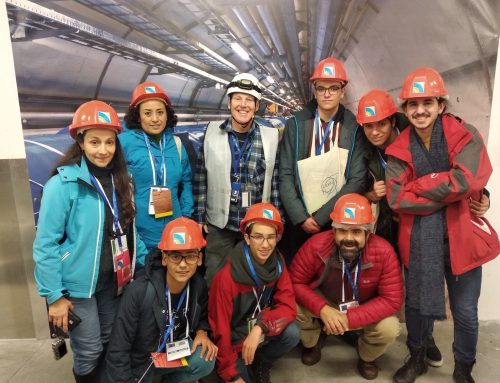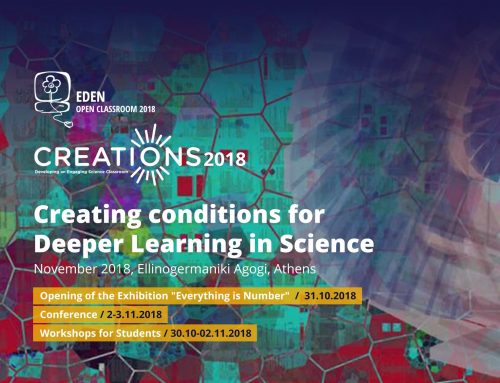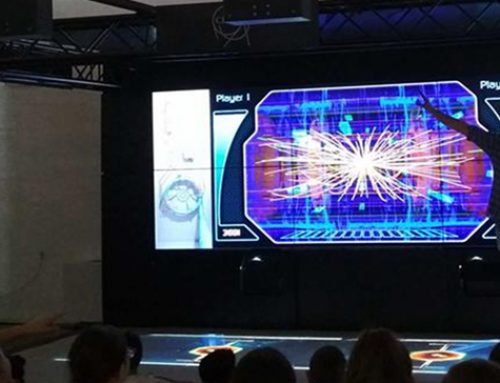
Can we use art and creativity to introduce complex scientific concepts to students? How can we develop an engaging science classroom and create conditions for deeper learning in science?
On the 2nd and 3rd of November 2018, more than 150 European teachers had the opportunity to engage in a productive dialogue between Science and Art using creativity as a vehicle. With speeches from leading experts in creative science education, stimulating workshops which introduce teachers in the classroom of the 21st century and the artistic exhibition “Everything is Number”, the CREATIONS final conference “Creating conditions for deeper learning in Science”, organized by Ellinogermaniki Agogi, provided insights and answers in these crucial issues.
Τhe CREATIONS 2018 conference was framed by the following five main themes:
- Creativity in Science Education,
- Deeper Learning through STEAM,
- Open School culture,
- Responsible Research and innovation and
- Project Based Learning.
Also, additional themes of the conference were “Building online teacher/learner communities”, “School collaborative activities using digital resources” and “Using other advanced technologies & scientific simulations in education”.
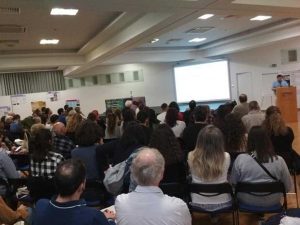
The conference was initiated by a keynote speech from Professor Dr. Franz X. Bogner, from the University of Bayreuth, coordinator of the CREATIONS project, who presented the project’s vision for “Creative inquiry-based long-term learning”. The next keynote speech, “Numbers and Art”, was given by Professor Peter Baptist, Chair of Mathematics and their Didactics, University of Bayreuth, coordinator of the prestigious EU projects SINUS and SINUS – Transfer.
The first day’s keynote speeches were concluded with the keynote speech: “Creative Encounters with the Sound of New Physics” in which the sonification of data coming from particle collisions at the LHC was demonstrated by Dr. Scott Wilson, Director of Electroacoustic Studios & Electroacoustic Sound Theatre, University of Birmingham.
The second day included a plenary session with presentations regarding STEAM approaches in Education and how to Create Conditions for Deeper Learning in Science through art. A set of innovative workshops for teachers was delivered: They were the first ones to experience the classroom of tomorrow, where the chalkboard is replaced by Augmented and Virtual Reality Instruments in order for students to create their own Mission to Mars and where the music classroom becomes an interactive sound laboratory where students are able to design, test and 3D print their own virtual musical instruments using the iMuSciCA virtual infrastructures. Teachers were introduced to data sonification using the IPSOS software and forged connections between Mathematics and Art in the “Everything is Number” exhibition. They explored the application of Democratic Values in the Classroom and learned how to connect Science and Art with the “Learning Science through Theater” action.
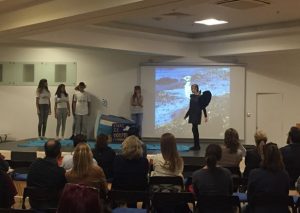
The second day’s program was framed by two keynote speeches on “ Informal Science Education” by Prof. Martin Storksdieck, Director of Center for Research on Lifelong STEM Learning, College of Education and School of Public Policy, Oregon State University and the way “Towards a Transcultural Music and Transcultural Musical Theatre” by Dr. Michael Ellison, Reader and Composer from the School of Arts of the University of Bristol, UK.
During the second part of the day, teachers involved in activities of the CREATIONS project presented their work in a dedicated poster session and participants had the opportunity to visit and discuss with them about the implementation of creative science education in the school practice.
Also, on Saturday, in the framework of CREATIONS 2018 conference a closed round table (working meeting) was organized. In this meeting, took part representatives from EU projects that aim to demonstrate deeper learning in STEM through Arts with the use of advanced technologies. The main goal of this meeting was to trigger the discussion on conceptualizing, creating the conditions & assessing Deeper Learning.
The conference was concluded with the 2017-2018winning performance of the Learning Science Through Theater action, “a Seagull in storm”, performed by students of the 3rd High School of Glyfada, Greece.
The large participation and enthusiastic feedback provided by the conference participants, provides evidence that the creative approaches in science education presented by the CREATIONS final conference can act as a foreground for changing the way science is taught in secondary education using art and creativity as vehicles.
The proceedings of the conference can be downloaded from here.



